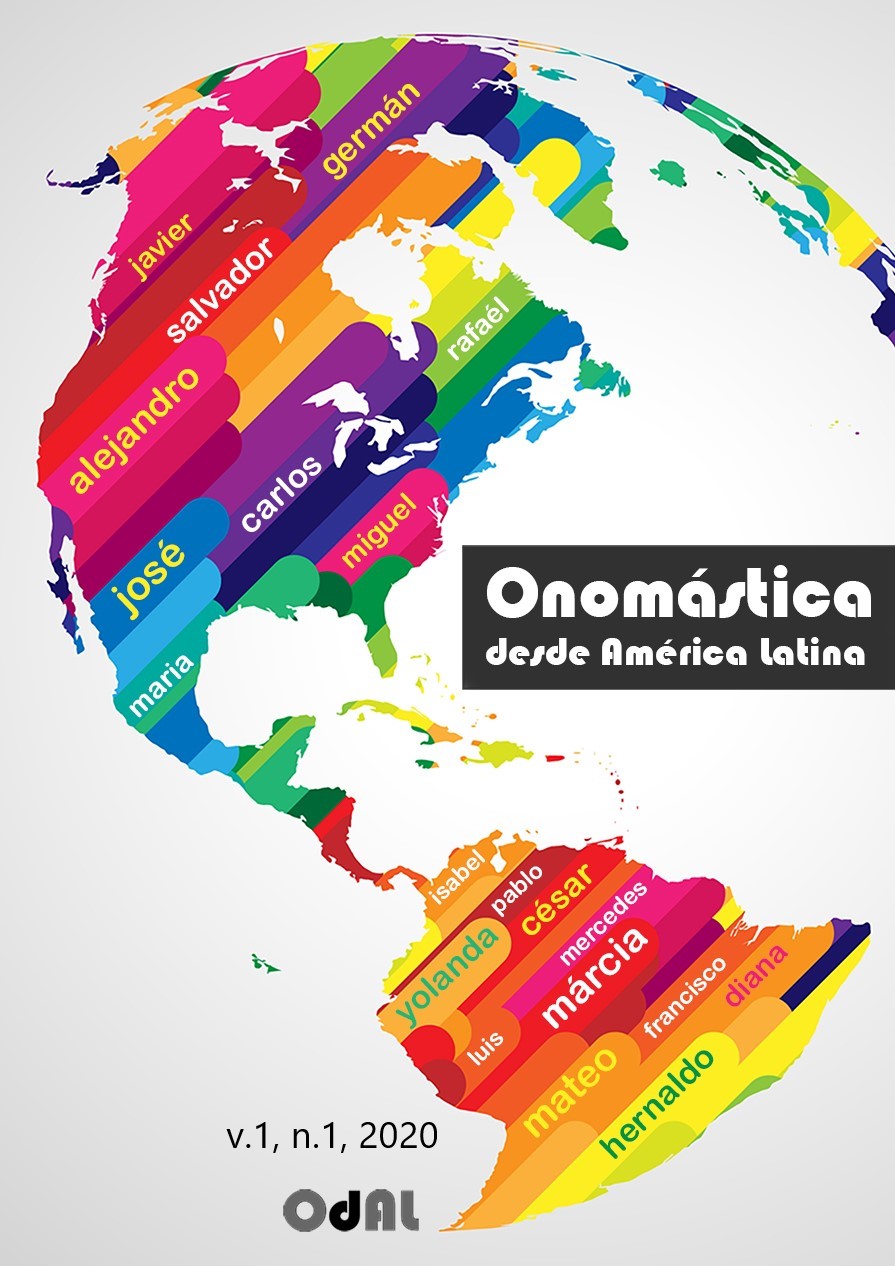Correlation between spelling variation and social class in antrhroponyms
DOI:
https://doi.org/10.48075/odal.v1i1.24158Keywords:
Onomastics, Socioantroponomastics, social class, first name spellingAbstract
This research aimed at verifying the existence of correlation between orthographic variation and social class in first names spelling of candidates of courses of Medicine, Dentistry, Letters and Pedagogy of the vestibular contest of 2013 of the Western Paraná State University (UNIOESTE) – Campus of Cascavel. The research was made based on two analysis: of the candidates first name spellings and of their responses to a social economical questionnaire. The analysis of the later data confirmed that while the majority of candidates of Medicine and Dentistry undergraduate course came from the economical elite of the society, the majority of Letters and Pedagogy students came from more popular social classes. According to the analysis of the candidates names conducted, this social class distinction did not led to great differences among first names of each group of candidates as standard spelling prevail in both, although on feminine names the rate of non-standard spelling is higher than on masculine names.
Keywords: Onomastics; Socioantroponomastics; social class; first name spelling.
References
Bortoni-Ricardo, Stella Maris. (2014). Educação em língua materna: a sociolinguística na sala de aula. São Paulo: Parábola.
Carvalho, N. (2009). Empréstimos linguísticos na língua portuguesa. São Paulo: Cortez.
Chambers, Jack .(1995). Sociolinguistic Theory: linguistic variation and its social significance. Oxford: Blackwell.
Dal mago, D. (2000). Uma análise da variável /l/ na fala da região sul do país. In: Anais do II Congresso Nacional da ABRALIN. Florianópolis: UFSC. Disponível em CD.
Dick, Maria Vicentina de Paula. (1992). Aspectos funcionais da antroponímia. Toponímia e Antroponímia no Brasil: coletânea de estudos. 3. ed. São Paulo: Serviço de Artes Gráficas da FFLCH/USP.
Freitag, R. M. K. (2007). A expressão do passado imperfectivo no português: variação/gramaticalização e mudança. Tese (Doutorado em Linguística) – Universidade Federal de Santa Catarina, Florianópolis.
Labov, W. (2001) Principles of linguistic change: social factors. Oxford: Blackwell.
López franco, Yolanda Guillermina. (2010) Un siglo de nombres de pila en Tlalnepanla de Baz. Universidad Nacional Autónoma de México. México: Plaza y Valdés.
Macaulay, R. K. S. (1977). Language, Social Class and Education: a Glasgow Study. Edinburgh: University of Edinburgh Press.
Massini-Cagliari, G. (2010). Discutindo questões de identidade a partir da (não) adaptação fonológica de nomes próprios de origem estrangeira no Brasil. In: Maria Helena de Moura Neves. (Org.). As interfaces da gramática. 1 ed. São Paulo/Araraquara: Cultura Acadêmica/Laboratório Editorial FCL, v. 1, p. 73-90
Mexias-Simon, Maria Lucia; Oliveira, Aileda de Mattos. (2004). O nome do homem: reflexões em torno dos nomes próprios. Rio de Janeiro: HP.
Paiva, Maria da Conceição de e Scherre, Maria Marta Pereira. (1999). Retrospectiva sociolinguística: contribuições do PEUL. DELTA [online], vol.15, n.spe, pp.201-232. ISSN 0102-4450.
Peres, E. P. (2006). O uso do você, ocê e cê em Belo Horizonte: Um estudo em tempo Aparente e em Tempo Real. 2006. 247 f. Dissertação (Mestrado em Linguística) – Universidade Federal de Minas Gerais, Belo Horizonte.
Seide, Márcia Sipavicius. (2008). Uso de antropônimos como elementos coesivos. Fórum Linguístico, Florianópolis, v. 5, n. 2, p. 23-35, jul./dez.
Seide, Márcia Sipavicius. (2016). Métodos de pesquisa em Antroponomástica. Domínios de Lingu@gem, Uberlândia, v. 10 n.3, p.1146-1171, jul./set.
Weinreich, Uriel; Labov, William; Herzog, Marvin. (2006). Fundamentos empíricos para uma teoria da mudança linguística. Trad. Marcos Bagno. São Paulo: Parábola.
Unioeste. (2012a) Listagem geral por curso. 2012a Disp. em < http://www5.unioeste.br/cogeps/arquivos/vestibular/2013geral/048.pdf> Acesso em 12, dez, 2012.
Unioeste. (2012b) Questionário Sócio-Educacional. 2012b Disp. em <http://www.unioeste.br/prg/socio-educacional/2013/matriculados_por_curso_022013.PDF.> Acesso em 12, dez, 2012.
Downloads
Published
How to Cite
Issue
Section
License
Copyright (c) 2020 Revista Onomástica desde América Latina

This work is licensed under a Creative Commons Attribution-NonCommercial-ShareAlike 4.0 International License.
Creative Commons Copyright Notice
Open Access Journals Policy
Authors who publish in this journal agree to the following terms:
1. Authors retain the copyright and grant the journal the right of first publication, with the work simultaneously licensed under the Creative Commons Attribution License that allows the sharing of the work with recognition of authorship and initial publication in this journal.
2. Mandatory authorities to assume commitments, for non-exclusive distribution of the version of the work published in this journal (eg, publish in an institutional repository or as a book chapter), with recognition of authorship and initial publication in this journal.
3. Authors are allowed and encouraged to publish and distribute their work online (eg in institutional repositories or on the personal page) at any point before or during the editorial process, as this can generate productive changes as well as increase impact and citation of the published work (See The Effect of Open Access).
Creative Commons License
This work is licensed under a Creative Commons Attribution-NonCommercial-ShareAlike 4.0 International License, which allows sharing, copying, distributing, displaying, reproducing, a whole or parts as long as it has no commercial purpose and is cited by authors and a source.

